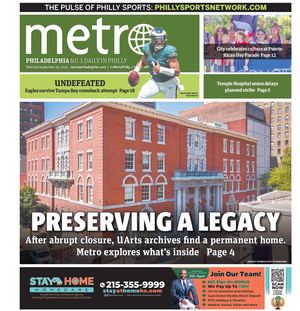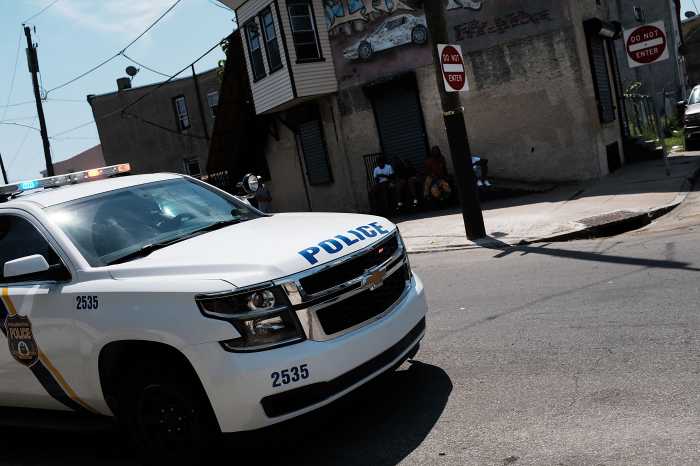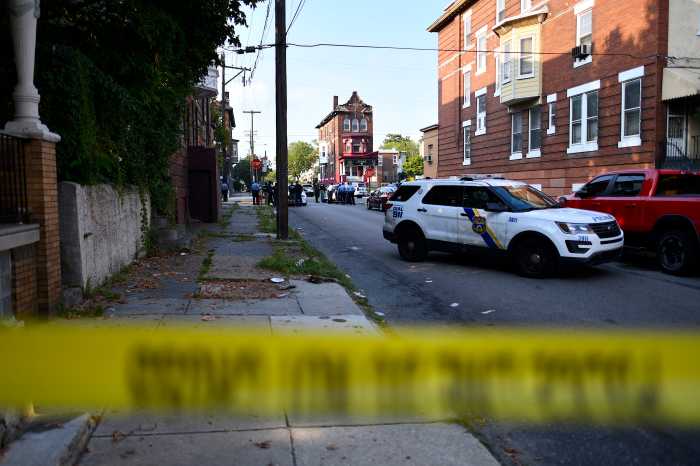Hunting Park resident Darnell Mann still remembers the day last summer when a shootout at the corner store at North 27th and West Sterner streets brought a bullet flying into the living room of his home.
“The store next door, the whole glass of the front door was shot out and the bullet went into the wall adjacent to my house,” he said. Pockmarks in the aluminum siding and a hole ripped through the blinds are tangible scars that daily remind him of the violence. “I have security bars on my front window, so a bullet ricocheted off that and came into my living room, where my granddaughter plays at, and kind of fell on the floor.” His daughter and granddaughter have since moved out of the neighborhood, fearing for the child’s safety.

Mann points out the bullet holes in the front of his home.
James Anglin, Sr., who has been living on the block for 35 years, pointed to similar welts dotting his car. “All four of my windows were shot out,” he said. He heard rumors that the same gun was used soon after in a homicide around the corner.

A memorial for a slain young man around the corner.
Neighbors say the tide of violence largely stems from small band of drug dealers that has been terrorizing the block. “There’s certain individuals that have been around for the last three years and the police haven’t locked none of them up,” Mann said. “Neighbors’ cars have been vandalized, some shot up. They’re shooting at each other, but we’re suffering. Kids are afraid to play outside. Older folks are afraid to go to the store on the corner because that’s where they gang up at.”
He said they use the corner store as a haven when rivals or police come around, hiding their drug stash inside the ATM slot or under boxes of cookies and candy. The shop owners are too afraid to take action, he said. “If they come outside their store and say, ‘Do you mind moving from in front?’ they’ll vandalize their car do something to the store,” he said. “It’s like they got this thing, like, ‘How dare you tell us to move?'”

The corner store owners are also being held hostage by the crime.
Unlike some residents of high crime areas, Mann and many of his neighbors are not afraid to ask for help. But he said, so far, their pleas to police and elected officials have gone largely unanswered. “They posted ‘No Loitering’ signs on the corner and these drug dealers don’t take it seriously because they don’t enforce it,” he said. “They take it as a joke.”

One man painted a white crosswalk blue and tagged a gang sign on
the pavement.
The culture of fear has devastated the block, Mann said. “It’s so bad that they had a food program around here for the kids where they feed them lunch during the day and they had blocked the street off,” he said. “Well, the drug dealers started mixing in with the kids while they were having a play street because the cops couldn’t pull down into the street. We’ve actually seen a couple of them eating the lunches that were for the kids.” He said the program was shut down due to worries that a rival street gang would open fire on the dealers as they hung out among the children.

Mann and Anglin in front of Anglin’s bullet hole-riddled car.
Anglin attributes much of the violence to the firearms that now flood the streets. “Thirty-five years ago, it wasn’t too bad,” he said. “We got a couple fist fights, but not no guns. Now, when you hear a gunshot, you got to hit the floor every time. There’s just too many guns. I mean, it’s hell. I’d be better off back in Jamaica.” But Mann plans to stay put. “They shouldn’t be running us out of our homes,” he said of the dealers. “They’re the ones that should be moving.”
Police perspective
39th District Capt. Verdell Johnson is familiar with Mann and his complaints. But he said that, according to crime statistics, the block is actually improving. “Our arrests is out the roof in that area,” he said. “But the things [Mann] wants, some of those things are unconstitutional and are not going to happen. Like I told him, I can’t go into any neighborhood, throw people against wall and frisk them. But we’re going to do as much as legally possible to police the neighborhood.” As far as enforcing the no loitering ordinance, he said that any action would lead to a citation, not jail time. “It’s basically just like issuing a parking ticket,” he said.

Enforcing the no loitering ordinance rarely leads to arrests.
Johnson recently requested floodlights to install on the corner as a deterrent and is set to pick them up from the city today. “They’ll light it up like the Eagles stadium,” he said. “Criminals do most of their crimes in the dark because you can’t see. You’ve got the little tiny streetlights out there, but I ride through there quite often and it’s not really well-lit. That should help, along with officers being out there.”

Despite the improvement, all-too-familiar teddy bear memorials still
dot the surrounding streets.
He said despite the fact that a personnel shortage in the district this year has forced officers to take on nearly double the work, firearm seizures are up over 40 percent. Police patrol the area on foot 16 hours a day, seven days a week, while most areas only have foot beats five days a week.
He also credits for the improvement a recently-concluded Citizens Engagement Academy, which taught residents to navigate various city services, and the work of Philly Rising, which cleaned up the area and planted a community garden.

Residents complain the streets fill back up with discarded beer cans and
liquor bottles mere hours after cleanups.
But as one block improves, Johnson said complaints have risen in surrounding areas. “We have to shuffle some resources around to help them out,” he said. “It’s a challenge to keep crime down because it constantly moves from one part of the district to other parts. But we’re trying to do the best we can.”

























